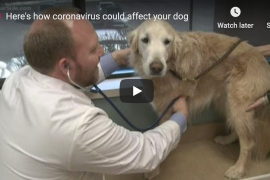Puppies are cuddly to hold, adorable to look at, fun to play with, and a great addition to a family. They are also costly to care for, time consuming to train, and often unpredictable.
You should never get a puppy on a whim. Spend some time thinking about the following…

#1: The Size Dog your Home Can Accommodate
While choosing a dog based on personality is important – you do need to be aware of the needs of the size dog you choose.
A large dog may be uncomfortable in a small apartment or you may find yourself uncomfortable with a large dog in a small apartment. Sharing a bed or couch with a bichon frise is one thing, sharing with a Saint Bernard is an entirely different thing. A high energy dog of any size will do better with a backyard to run in.
#2: Puppies Chew on Everything
You’ll need to dog proof your home before you bring your puppy home.
Make sure you have a safe place where you can put the dog when you’re gone away from shoes, children’s toys, electric cords and other items that can be dangerous.
Chewing helps calm a dog so make sure he has many safe chew togs available at all times.
#3: How to Crate Train
You’ll need to have a crate ready, the right size for your dog. He needs to be able to stand and turnaround. As he gets older buy larger crates but it shouldn’t be too large at first. Dog’s don’t like to defecate where they sleep. But if the crate is too large they’ll use one side of the crate as their bathroom and sleep on the other side.
Read about crate training before you bring your puppy home.
#4: Don't Invite Everyone Over to See Your New Pup
It’s understandable that you want everyone to see the adorable new member of your family. But resist the urge to bring new people into your home. Give your puppy time to adjust to his new surroundings and his new family before bringing anyone else into his life.
#5: Your Kids Need to be Taught How to Treat a Dog
Along with training your dog you’ll need to teach your children how their pet needs to be cared for.
They need to understand they can’t squeeze the dog too hard, even with a loving hug. Teasing and pulling the dog’s tail is never acceptable.
When you feed your dog the kids need to understand to stay away and not bother the dog while eating. After feeding the dog immediately put the food up and out of reach. This prevents accidents when you’re not around.
Preschoolers will need to be supervised while they’re with your puppy. It’s sometimes better to wait until your children are a little older before buying them a dog. But if you already have a dog when your baby arrives you’ll need to help them adjust to each other.
#6: How Much Time it Takes to House-Break
It’s important to look at your situation realistically. Does everyone in your house work forty or more hours away from home? If so, who is going to be around to let your puppy out every two or three hours? Can you afford to hire a pet sitter for daily visits during those first few months?
#7: The Best Time to Bring Your Puppy Home is Around Ten Weeks
Your dog needs to be weaned for a week or two before leaving its mother. Seven weeks is too young but it’s better to make the break and not wait too long.
#8: The Costs of Owning a Dog
Buying a dog is only the beginning of your expenses. Dogs need shots, supplies, foods, visits to the vet and sometimes obedience classes or a trainer. If a pet suffers from health problems these costs can escalate quickly. Make sure you’re prepared financially.
You can buy health insurance for your dog. Talk to your vet about whether it’s worth the cost and read the fine print regarding what it does and doesn’t cover.
#9: Is Anyone in Your Family Allergic to Dogs?
While it’s true that some dogs shed less than others, it is the skin of the dog, not the hair that causes allergy problems, so no dogs are completely hypoallergenic. Visit homes with dogs and see if any family members have a problem.
#10: Do You Expect Big Changes in Your Life in the Next Few Years?
If you think you may be moving to a new area or expecting a new baby, you need to consider that when getting a dog. Adopting a dog is adding a family member. For richer or poorer, in sickness and in health. Many poor dogs end up in shelters because the family moved to an apartment that didn’t allow pets, or they decided a dog and a baby was too much to handle.
Think of the possible factors in advance and be sure you’re willing to make your dog part of your future – no matter what changes.



